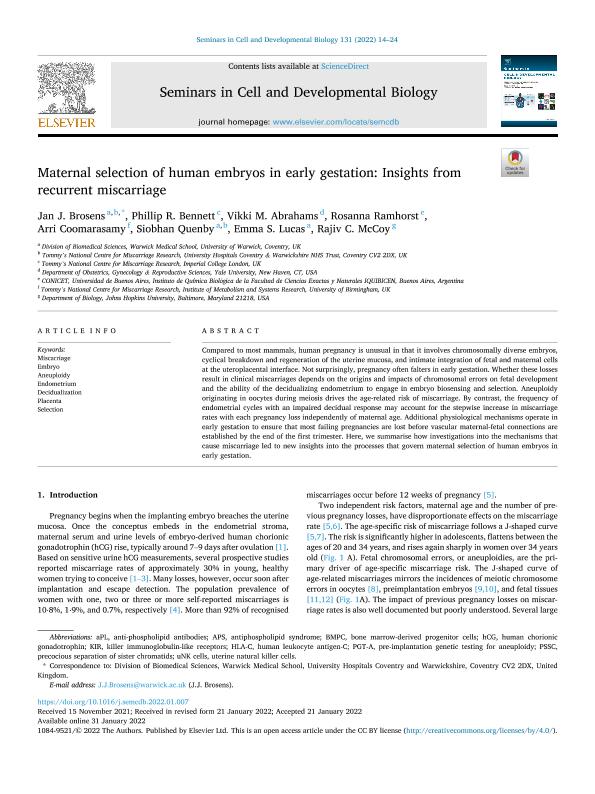Artículo
Maternal selection of human embryos in early gestation: Insights from recurrent miscarriage
Brosens, Jan J.; Bennett, Phillip R.; Abrahams, Vikki M.; Ramhorst, Rosanna Elizabeth ; Coomarasamy, Arri; Quenby, Siobhan; Lucas, Emma S.; McCoy, Rajiv C.
; Coomarasamy, Arri; Quenby, Siobhan; Lucas, Emma S.; McCoy, Rajiv C.
 ; Coomarasamy, Arri; Quenby, Siobhan; Lucas, Emma S.; McCoy, Rajiv C.
; Coomarasamy, Arri; Quenby, Siobhan; Lucas, Emma S.; McCoy, Rajiv C.
Fecha de publicación:
11/2022
Editorial:
Academic Press Ltd - Elsevier Science Ltd
Revista:
Seminars In Cell & Developmental Biology
ISSN:
1084-9521
Idioma:
Inglés
Tipo de recurso:
Artículo publicado
Clasificación temática:
Resumen
Compared to most mammals, human pregnancy is unusual in that it involves chromosomally diverse embryos, cyclical breakdown and regeneration of the uterine mucosa, and intimate integration of fetal and maternal cells at the uteroplacental interface. Not surprisingly, pregnancy often falters in early gestation. Whether these losses result in clinical miscarriages depends on the origins and impacts of chromosomal errors on fetal development and the ability of the decidualizing endometrium to engage in embryo biosensing and selection. Aneuploidy originating in oocytes during meiosis drives the age-related risk of miscarriage. By contrast, the frequency of endometrial cycles with an impaired decidual response may account for the stepwise increase in miscarriage rates with each pregnancy loss independently of maternal age. Additional physiological mechanisms operate in early gestation to ensure that most failing pregnancies are lost before vascular maternal-fetal connections are established by the end of the first trimester. Here, we summarise how investigations into the mechanisms that cause miscarriage led to new insights into the processes that govern maternal selection of human embryos in early gestation.
Palabras clave:
ANEUPLOIDY
,
DECIDUALIZATION
,
EMBRYO
,
ENDOMETRIUM
,
MISCARRIAGE
,
PLACENTA
,
SELECTION
Archivos asociados
Licencia
Identificadores
Colecciones
Articulos(IQUIBICEN)
Articulos de INSTITUTO DE QUIMICA BIOLOGICA DE LA FACULTAD DE CS. EXACTAS Y NATURALES
Articulos de INSTITUTO DE QUIMICA BIOLOGICA DE LA FACULTAD DE CS. EXACTAS Y NATURALES
Citación
Brosens, Jan J.; Bennett, Phillip R.; Abrahams, Vikki M.; Ramhorst, Rosanna Elizabeth; Coomarasamy, Arri; et al.; Maternal selection of human embryos in early gestation: Insights from recurrent miscarriage; Academic Press Ltd - Elsevier Science Ltd; Seminars In Cell & Developmental Biology; 131; 11-2022; 14-24
Compartir
Altmétricas



